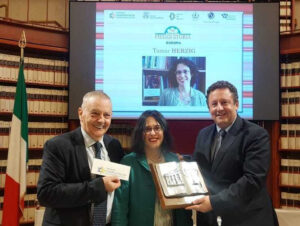WAR AND SEXUAL VIOLENCE – Tamar Herzig: The silence of Italy stings
 “A great silence has fallen [on the rape of Israeli women by Hamas.]” And it is painful to think that “this silence is so significant in Italy, the country I love most, but where hypocrisy is stronger than elsewhere. It hurts very much.” This is the complaint of Tamar Herzig, an Israeli historian and professor at the Faculty of Humanities of Tel Aviv University. The scholar is currently in Rome, where she has just been awarded the Fiuggi Storia Europa Prize for her research on the Italian Renaissance.
“A great silence has fallen [on the rape of Israeli women by Hamas.]” And it is painful to think that “this silence is so significant in Italy, the country I love most, but where hypocrisy is stronger than elsewhere. It hurts very much.” This is the complaint of Tamar Herzig, an Israeli historian and professor at the Faculty of Humanities of Tel Aviv University. The scholar is currently in Rome, where she has just been awarded the Fiuggi Storia Europa Prize for her research on the Italian Renaissance.
Storia di un ebreo convertito (A Convert’s Tale), her latest book published by Viella, focuses on the life of the Jewish goldsmith Salomone da Sessa. Accused of sodomy, he managed to save himself by converting to Christianity, thus gaining the support of the Catholic elite of the time.
In her books, Herzig also gives voice to female figures. She does so, for example, in Le donne di Savonarola (Savonarola’s Women), published by Carocci; an essay in which Herzig investigates the network of followers of the moralizing friar. Savonarola went from the “bonfires of vanities” in which he hoped to “burn” the vices of the Florentines to the flames that enveloped him in Piazza della Signoria at the command of Pope Borgia. In short, the feminine is pivotal in her studies and also in her commitment as an intellectual looking at the present.
As an Israeli with a 19-year-old son in the army, Herzig expresses regret “that no voice is being heard for the women held hostage by terrorists in Gaza – and many of whom are still in the tunnels – or for the children”. [An international discussion] in which “unfortunately Italy stands out for its poor performance: I came across many silences, even among colleagues in academia. There is hesitation, there are closures, in expressing solidarity.”
Herzig’s love for Italy goes back to her early twenties. “My family is originally from around Poland and Hungary. My parents were both born in 1947, in two different refugee camps set up in those transitional years. I am the first ‘sabra’ [Israeli] of the family. In my youth, I went on a trip to Italy, in particular to Florence. The city is so beautiful you never get tired of it,” says Herzig, who, on December 31, is going to start the new academic year with a lesson on how the first seeds of the Renaissance were sowed on the banks of the Arno river. In March, war permitting, her goal is to return to Rome to work on the project “Female Slavery in Mediterranean Catholic Europe,” a field in which Herzig is a pioneer.
a.s.
Translated by Annadora Zuanel, revised by Francesca Pischedda, students at the Secondary School of Modern Languages for Interpreters and Translators of the University of Trieste, interns at the newspaper office of the Union of the Italian Jewish Communities – Pagine Ebraiche.
